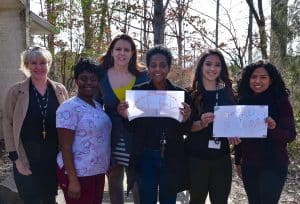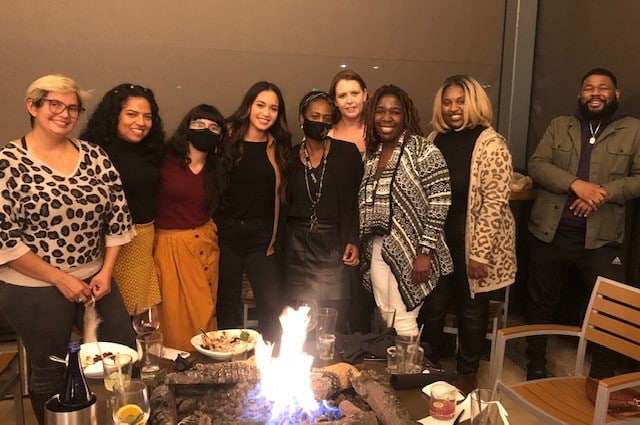Every day, unwavering champions at Leland House face crises head-on. And every day, unwavering champions at Leland House relentlessly pursue solutions for the young people and families they serve.
“Our program really focuses on prioritizing safety for the youth we serve,” said Marie Thomas, an LCSW and Program Director for Leland House, a partnership between Fairfax County and UMFS that provides short-term stabilization for youth ages 12-17. “We understand that behaviors are a byproduct of something bigger.”
For the last two years, the “something bigger” has largely been COVID-19, which has compounded already delicate situations for young people. This was especially true in the earliest days of the pandemic, when families were concerned about placing their children in residential programs like Leland House.
(Pictured above: Leland House staff enjoyed some well deserved down time at a recent team-building outing. Pictured below: This photo was taken in February 2020, just weeks before COVID-19 caused much of Virginia to shut down.)
“Families didn’t want to send their children to congregate-care settings, because they were at higher risk for COVID transmission,” Marie said. “But at the same time, intensive in-home services weren’t as readily available because providers weren’t able to offer those services. So, by the time youth got to us, they were navigating some really complex and untreated needs.”
Marie and her team at Leland House never ceased providing services. Instead, they exercised adaptability and made a number of adjustments to ensure they could continue meeting the needs of young people. Even when much of the country — and world — had paused in-person interactions, the team at Leland House marched on together. “Our staff have been fearless,” Marie said proudly.
Laura Giunta, Program Director for the UMFS Northern Virginia Region, echoed the sentiment. “Marie and her team have shown the essence of great social workers,” Laura said. “They’ve been meeting people where they are.”
And during a pandemic, meeting people where they are means enlisting Telehealth. When in-person visits weren’t an option, Leland House utilized Telehealth to facilitate engagement with youth in care and their families. “We’ve been using technology and incorporating therapeutic sessions in different ways,” Marie said.
Initially, the concern was that Telehealth might not be effective. But Marie, her team, and the families served by Leland House were pleasantly surprised with the outcomes. “Telehealth really has had huge benefits and impact,” Marie said.
Even as Leland House re-introduces many of its in-person interactions, Telehealth remains an option for families facing challenges with child care or transportation. Ultimately, Telehealth provides greater flexibility for more frequent and regular family sessions, Marie said. “If the families can’t make sessions in-person, then often they can join virtually. On the flip side, sometimes families have limited internet. The digital divide is a real thing.”
Just as the digital divide is a real thing, so, too, is the divide between staff who can perform their jobs from afar and staff who provide direct care. Teleworking was never an option for the team at Leland House, nor did they wish to back down from serving young people in their care.
“They really should be celebrated,” Laura said. “Marie is ensuring that the needs of her staff are getting met so they can continue to support the youth. The team has been steady, and they have responded so well to a complicated situation.”
Laura praised Leland House team for their bravery and persistence in making sure young people continued to receive high quality care throughout the global health crisis. But she noted that the hard work being done at Leland House was always about much more than just managing coronavirus in the close confines of an eight-bedroom house. “Yes, there was the managing of the physical space,” Laura explained. “But Marie and her team also worked closely with Fairfax County to make sure educational expectations were being met for youth.”
“At Leland House, everything happens now, now, now,” Laura continued. “The team might come into work on a Friday with two open beds, and by Monday those beds are filled. It can be very overwhelming, but Marie is able to circle back and stay on top of things. She is one of those people who can shift their brains to make sure all avenues are covered.”
Thankfully, Leland House hasn’t endured a substantial outbreak of COVID-19. Aside from a few cases among staff, mitigation efforts employed by Leland House have been effective. Marie credits the collaboration between her team and the young people they serve with helping to sustain safety. “Just tons of resilience from youth and staff,” Marie said.
Health and safety have always been paramount, of course. But during the height of the pandemic, there also was an urgency to stave off feelings of isolation. When in-person visits and off-site activities were suspended because of COVID, Leland House staff employed creativity to keep youth engaged. Outside support from community partners and volunteers wasn’t an option, so the team began utilizing its outdoor spaces. “Staff put together scavenger hunts on the property,” Marie said. “They were making their own obstacle courses outdoors and sometimes even inside.”
COVID-19 brought the Leland House community together in ways Laura said she never could have imagined. While she’s always known that Leland House and its team are special and that the partnership with Fairfax County is invaluable, she didn’t know that unprecedented circumstances would initiate such an incredible period of reflection among the staff. “They really evaluated why they were there together as a team,” Laura said. “It’s been transformative.”
Marie agreed. The experience, she said, has impacted every team member, many of whom are young mental health professionals just beginning their careers.
“I have really been touched and blessed by the staff who have shown up day in and day out, not knowing what that brings,” Marie said. “It’s funny to hear everyone when they say they’ve been home for two years. When the rest of the world shut down because of COVID, that was not the world for the staff and youth we work with.”
